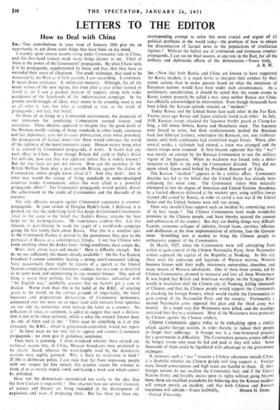SIR, — Now that both Russia and China are known to have
supported the Korea incident, it is much better to interpret their conduct by their recent actions than to make guesses based on what the intentions of European nations would have been under such circumstances. As a preliminary consideration, it should be noted that the recent events In Korea cannot properly-be called a war, since neither Russia nor China has officially acknowledged its intervention. Even though thousands have been killed, the Korean episode remains an "incident."
Today Russia and the United States face each other in the Far East. Twelve years ago Russia and Japan similarly faced each other. In July, 1938, Russian troops attacked the Japanese border guard at Chang-ku- fcng, a hill where Siberia, Korea and Manchuria meet. The Japanese were forced to retire, but their reinforcements pushed the Russians back into Siberian territory, whereupon the Russians, too, sent reinforce- ments, until both combatants had committed major forces. When, after several weeks, a stalemate had ensued, a truce was arranged and the excess troops were removed. It then became apparent that this " war" was merely an attempt by the Russian Communists to test the military vigour of the Japanese. When no weakness was found, only a deter- mination to fight to the end, the Communists desisted. They did not again attack Japan until bribed by President Roosevelt at Yalta.
The Korean "incident" appears to be a similar affair. Communist doctrine has led to the belief that the United States has already been collapsing for some time. The Communist rulers then naturally attempted to test the degree of American and United Nations decadence by a limited offensive delivered at the weakest spot, using satellite troops trained and armed by Russia, in order to avoid a real war if the United States and the United Nations were still too strong.
Then why should China support such an incident by committing some of its best troops ? The Chinese Communists have made wonderful promises to the Chinese people, and have thereby secured the consent and submission of the country. But they are finding things very difficult. Famine, economic collapse of industry, forced loans, currency inflation, and disillusion at the slow implementation of reforms, face the Govern- ment. Something new is needed to bring the Chinese people to enthusiastic support of the Communists.
In March, 1927, when the Communists were still attempting from within to gain control of the Chinese Nationalist Party, three Nationalist armies captured the capital of the Republic at Nanking. In this city there were the embassies and legations of Western nations, Western business houses with their staffs, missionary universities, churches, and many dozens of Western inhabitants. One of these three armies, led by Chinese Communists, planned to massacre and loot all these Westerners. It was hoped that British and American warships on the Yangtze River would in retaliation shell the Chinese city of Nanking, killing thousands of Chinese, and that the Chinese people would support the Communists in attacking the foreign Powers, which would enable the Communists to gain control of the Nationalist Party and the country. Fortunately a second Nationalist army opposed this plan and the third army was neutral. As a result very few Westerners were killed, and the warships restricted their fire to a minimum. Most of the Westerners were protected by Chinese against the Chinese soldiers.
Chinese Communists appear,today to be embarking upon a similar attack against foreign nations, in order thereby to induce their people to forget their sufferings. A foreign war is a time-honoured panacea for a government in difficulties. The Communists possess armies inflated by hungry troops who must be fed and paid or they will rebel. Some thousands of them could be liquidated with advantage to the government exchequer.
lf, however, such a " war " remains a Chinese adventure outside China. it is doubtful whether the Chinese people will long support it. Foreign wars, forced conscriptions and high taxes are hateful to them. lf, then. foreign nations do not swallow the Communist bait, and if the United Nations firmly and forcibly insists upon its rights without going beyond them, there are excellent precedents for believing that the Korean incident will remain merely an incident, and that both Chinese and Russian truculence will subside.—Yours faithfully,
HOMER H. Dims






































 Previous page
Previous page